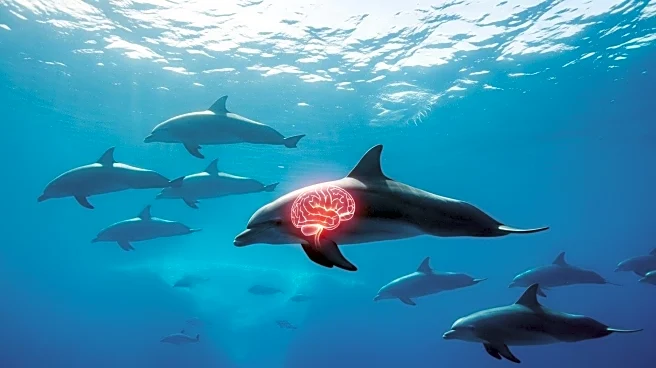What is the story about?
What's Happening?
A study conducted on stranded dolphins in Florida's Indian River Lagoon reveals signs of Alzheimer's-like brain changes linked to algal blooms. Researchers found that the brains of dolphins stranded during algal bloom seasons contained high levels of the neurotoxin 2,4-diaminobutyric acid, which is associated with memory loss. The study suggests that climate change, through increased algal blooms, may exacerbate neurodegeneration in dolphins. Dolphins are considered environmental sentinels, and their brain changes could indicate potential risks to human health from cyanobacterial toxins. The research highlights the need for further investigation into the impact of algal blooms on marine life and potential implications for human neurodegenerative diseases.
Why It's Important?
The study underscores the environmental and health risks posed by algal blooms, which are becoming more frequent due to climate change. Dolphins serve as indicators of marine ecosystem health, and their brain changes could signal broader ecological impacts. The findings suggest that toxins from algal blooms may contribute to neurodegenerative diseases, raising concerns about human exposure through the food chain. Understanding these links is crucial for developing strategies to mitigate the effects of climate change on marine life and human health.
What's Next?
Further research is needed to establish direct links between algal bloom toxins and human neurodegenerative diseases. Scientists may explore the pathways through which these toxins accumulate in the food chain and their potential impact on human health. Efforts to monitor and manage algal blooms could be intensified to protect marine ecosystems and reduce health risks. Collaboration between environmental scientists and health researchers may lead to comprehensive strategies addressing the dual challenges of climate change and neurodegeneration.
Beyond the Headlines
The study highlights the interconnectedness of environmental health and human health, emphasizing the need for holistic approaches to address climate change impacts. It raises ethical questions about the responsibility to protect marine life and ecosystems from human-induced changes. The research also points to the importance of interdisciplinary studies in understanding complex environmental and health issues.















